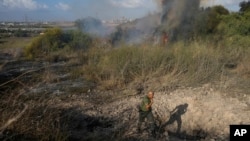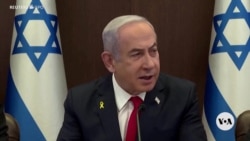New tensions erupted in the Middle East on Sunday as Houthi rebels in Yemen hit Israel with a missile attack and Israeli Prime Minister Benjamin Netanyahu quickly vowed to retaliate.
The missile landed in an open area in central Israel and triggered air raid sirens at Ben Gurion International Airport near Tel Aviv. Israeli media aired footage showing people racing to shelters, although there were no reports of casualties or major damage. The airport authority said normal operations resumed shortly thereafter.
Netanyahu said at the start of a Cabinet meeting, "This morning, the Houthis launched a surface-to-surface missile from Yemen into our territory. They should have known by now that we charge a heavy price for any attempt to harm us."
"Those who need a reminder in this matter are invited to visit the port of Hodeida," he added, referring to Yemen's Red Sea city that Israeli warplanes bombed in July after the Houthis claimed a drone strike that killed a civilian in Tel Aviv and wounded 10 others.
Watch related report by Arash Arabasadi:
The Yemeni rebels have repeatedly fired drones and missiles toward Israel since the start of the Israeli-Hamas war in Gaza last October, but nearly all of them have been intercepted over the Red Sea.
In the latest attack, Brigadier General Yahya Saree, a military spokesperson for the rebels, said they fired a ballistic missile aiming at "a military target" in Jaffa, which is part of Tel Aviv.
The Houthis are among several Iran-backed groups in the Middle East that have been drawn into the conflict triggered by Hamas' shock attack on southern Israel last October 7 that killed 1,200 people and led to the capture of 250 hostages. Israel’s counteroffensive in Gaza has killed more than 41,000 Palestinians, a death toll Israel says includes several thousand militant fighters.
On Israel's northern flank, Lebanon's Iranian-backed Hezbollah movement has traded regular cross-border fire with Israeli forces in exchanges that threaten to spiral into all-out war. The Israeli military said about 40 projectiles were fired Sunday morning from Lebanon toward Israel's Upper Galilee region and the annexed Golan Heights.
Netanyahu said Sunday that the current situation along the Israeli-Lebanon border, where tens of thousands of people have been displaced, was not sustainable.
"The existing situation will not continue. We will do everything necessary to return our residents safely to their homes," he said.
"We are in a multi-arena campaign against Iran's evil axis that strives to destroy us," he said.
Netanyahu described speaking with residents and authorities in the north, saying, "I hear the distress, I hear the cries.”
"The status quo will not continue,” he said. “This requires a change in the balance of power on our northern border."
Hezbollah has said it would halt its attacks if there were a cease-fire in Gaza. The United States and Arab mediators Egypt and Qatar have spent much of this year trying to broker a truce and the release of scores of hostages held by Hamas, but the talks have repeatedly bogged down.
Hamas has been designated a terror group by the U.S., the U.K., EU and other Western countries.
Some material in this report came from The Associated Press and Agence France-Presse.







